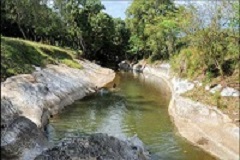Implantation of the Tax for the Approved Shedding of Residuals in River Basins
Keywords:
taxes, watersheds, residualsAbstract
The present work is related to Guideline No. 49, result of the updating of the Guidelines of the Economic and Social Policy of the Party and the Revolution, approved in the VII Congress of the Communist Party of Cuba, ratifying the need to improve the application of fiscal stimuli that promote the protection of the environment. It deals with the implementation and management of the Tax for the Approved Dumping of Residuals in Hydrographic Basins, the existing limitations in its implementation and management and provides as a tool an action plan that allows to improve the application of the tax.
References
Asamblea Nacional del Poder Popular. (1981). Ley No. 33 De Protección del Medio Ambiente y del Uso Racional de los Recursos Naturales. La Habana, Cuba.
Asamblea Nacional del Poder Popular. (1997). Ley No. 81 Del Medio Ambiente. Ciudad de La Habana, Cuba.
Asamblea Nacional del Poder Popular. (2003). Constitución de la República de Cuba (Extraordinaria No. 3 de 31 de enero de 2003 ed.). La Habana: Gaceta Oficial de la República de Cuba.
Asamblea Nacional del Poder Popular. (2012). Ley No. 113 Del Sistema Tributario (Ordinaria No. 33 de 20 de agosto de 2012 ed.). La Habana: Gaceta Oficial de la República de Cuba.
Desafíos y propuestas para una implementación más efectiva de instrumentos económicos en la gestión ambiental de América Latina y el Caribe. (2000). XII Reunión del Foro de Ministros de Medio Ambiente de América Latina y el Caribe. Barbados.
García Poma, Y. (2017). Plan de acción para perfeccionar la implementación y gestión del Impuesto por el Vertimiento Aprobado de Residuales en Cuencas Hidrográficas. Trabajo Final de la Especialidad en Administración Tributaria. La Habana, Cuba: Facultad de Contabildad y Finanzas, Universidad de La Habana.
Garrido Vázquez, R. J. (2003). Estudio de caso: Cuba. Aplicación de instrumentos económicos en la política y la gestión ambiental. Serie 60 medio Ambiente y Desarrollo, Publicación de las Naciones Unidas LC/L.1791-P.
Martínez Gómez , D. (2011). Evaluación de la Gestión Tributaria en la ONAT del municipio Colombia. Trabajo de Diploma. Las Tunas, Cuba: Facultad de Ciencias Económicas, Universidad Las Tunas.
Oficina Nacional de Normalización. (2007). Norma Cubana 521: 2007 de Vertimiento de aguas residuales a la zona costera y aguas marinas- Especificaciones. Oficina Nacional de Normalización.
Oficina Nacional de Normalización. (2012). Norma Cubana 27:2012 de Vertimiento de aguas residuales a las aguas terrestres y al alcantarillado . La Habana: Oficina Nacional de Normalización.
PROFAFOR Latinoamérica. (s.f.). Recuperado el 12 de mayo de 2017, de http://www.profafor.com/CeroCarbono26.pdf
Rosembuj , T. (1995). Los tributos y la protección del medio ambiente. Madrid: Ed. Marcial Pons.
Salassa Boix , R. (2013). Cuestiones elementales de los tributos medioambientales.
Villar Ezcurra , M. (2003). Desarrollo sostenible y tributos ambientales. Crónica Tributaria ( 107), 123-137.
Yacolca Estares , D. I. (2013). Reforma Fiscal Verde para Sudamérica. Madric: V Edición de la Beca de Investigación.

Downloads
Published
How to Cite
Issue
Section
License

This work is licensed under a Creative Commons Attribution-NonCommercial-NoDerivatives 4.0 International License.
- Sending a contribution to the Cuban Magazine of Finance and Prices (RCFP) implies a non-exclusive assignment of rights, which includes: Reproduce the Article in whole or in part and communicate the Article to the public in print or electronic format, combined or not with the works of third parties, such as by making the Article available to the public via the Internet or any other network, as part of a database, with on-line or off-line access, for use by third parties; Translate the Article into other languages and release the translation to the public; Create adaptations, summaries, or excerpts of the Article and other derivative works thereof, and exercise all of your rights in such adaptations, summaries, excerpts, and derivative works; Include the Article, either in its translated, adapted or summarized version, totally or partially, in a computerized database and make it available to third parties; Include the Article, totally or partially, either in its translated, adapted or summarized version, in a selection or compilation of texts; Rent or lend the Item to third parties; Reproduce the Article by means of reprography, without prejudice to legal limitations.
The Author of articles published in the Cuban Magazine of Finance and Prices (RCFP) may exercise the following rights:
- Reproduce the Article, totally or partially, and disseminate its content or make it available to the public, in printed or electronic format, as part of a teaching content or as a compilation, for use in the academic or research field in the institution to the one to which the Author belongs or in those institutions to which he belongs.
- Publish the Article on the Internet or authorize the Author's institution (or any other appropriate organization) to do the same, immediately from the date of publication of the Article in the journal: within the institution's closed network (p. eg, the intranet); or in publicly accessible institutional repositories or centrally organized repositories, provided that a link to the Article is included on the journal's website.
- Grant to the Author's own institution (or any other appropriate organization) the authorization to reproduce the Article in order to prevent its deterioration or, if the original is in an obsolete format or the technology to use it is not available, in order to ensure that the Article remains available for teaching or research purposes;
- Present the Article at a meeting or conference, and distribute copies of the Article to those attending the event.
- Grant end users at the Author's own institution (or any other appropriate organization) permission to copy, use, transmit, and publicly perform the work and to create and distribute derivative works.



